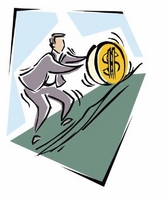Why you should pay your debts
Published: Sunday | August 16, 2009

Legislation facilitating the creation of credit bureaus is under consideration, and soon, it will be fairly easy to establish your track record for paying your debt through credit agencies.
So, if you are one of those who routinely fails to pays credit-card bills, falls behind on car payments and your mortgage, the new system will make it easier for lenders to obtain this information. a bad credit history could limit your ability to borrow in the future.
The consequences of allowing bills to pile up are far more serious than a reputation spoiled by a bad report.
As Elena Villafana-Sylvester, Scotiabank Jamaica's vice-president of retail banking, said failure to service loans is a breach of contract and exposes the borrower to legal action.
Loan default occurs when a borrower breaches all or part of a loan agreement or condition of credit.
While failing to make instalments as agreed is the most commonly highlighted breach, there are others, such as failing to keep the security insured - real-estate secured loans - and improper use of the security.
If the debt that you are ignoring is your mortgage, you may lose one of the best investments you could make in your future and that of your family.
first response
Sophia Lewis, communications officer with the National Housing Trust, pointed out that although the trust's first response was to work with mortgagors on solutions for repayment, eventually, it would be forced to begin legal action, usually ending in confiscation of the asset and forced sale via public auction or private treaty.
If a payment is not made after 15 days, then late fees are added.
The debt-servicing cost also multiplies.
If arrears are not cleared after 90 days and there has been no arrangement for payment, legal action will ensue.
Locally, legal sources add, Jamaicans do not have the protection from their creditors that citizens of the United States and other jurisdictions have.
"I do not know of any laws which grant protection to individuals who are indebted. We do not have Chapter 11 laws, such as those which exist in the United States," said attorney Hilma McNeil of Hilma McNeil and Company in Kingston.
"Instead, you can be declared bankrupt by one of your creditors, an action which means that all your assets can be sold and distributed among your identified creditors.
"In the meantime, a number of restrictions are placed on you in terms of economic activity.
"You will not be able to become a company director for a number of years, and in order for you to be freed, you will have to go back to court and ask for discharge. In the meantime, your credit rating will be zero," McNeil said.
The attorney said the only option for those trapped in indebtedness is to sit with creditors and renegotiate the loan outstanding, and that it is best to do so before the issue reaches the courts.
Villafana-Sylvester said that debt default:
Increases the cost of borrowing, since all costs, incurred by the lender in trying to recover the sum loaned is for the account of the borrower.
Increases interest costs as it continues to accrue on higher principal balances as a result of the default and is due and payable to the lender.
Results in the borrower relinquishing rights of ownership of any security pledged, and the lender can exercise its powers under a bill of sale to dispose of the asset to recover the sum owing, hence resulting in loss of property.
Destroys the borrower's credit rating and limits opportunities for future credit with the lender, or even other lenders.
The banking executive said that on default, borrowers need not panic, as in most cases, the financial institution will work with customers to ascertain the problem, and resolve it.
The first action is likely to be the issuance of a letter of demand for full payment and/or reclassification of the loan as non-performing 90 days after default.
The letter of demand gives the lender 30 days in which to respond.
It is only failure to respond, which will result in the assignment of loan to the bank's attorneys, who will also issue a second letter of demand before the commencement of foreclosure proceedings.
maintain contact
In the case of default, the borrower is advised to maintain contact with the bank/lender and forthrightly discuss the problem and circumstances resulting in default.
He or she should look frankly at options and discuss resolutions and alternative arrangements, such as refinancing, payment holidays, or nominal payments, pending sale of assets and security.
In general, failure to pay bills on time leads to an accumulation of interest, with the end result a rise in the debt owed.
Unpaid debt in the thousands can literally become a million-dollar liability.
It is better to pay a part of your debt than nothing at all, as this will go towards reducing the impact of penalties and also stand you in good stead with your creditors.
Considering your situation, which you know best, it might be prudent to sell some free assets in order to pay off and remove the burden of outstanding payments.
If you allow your assets to be sold out from under you, you will receive less monetary benefit from the sale.
avia.collinder@gleanerjm.com
























